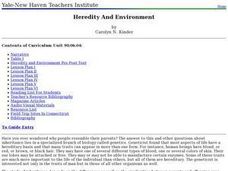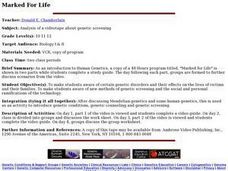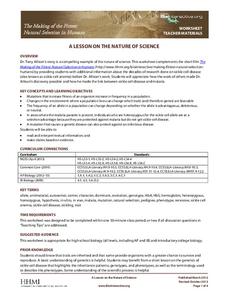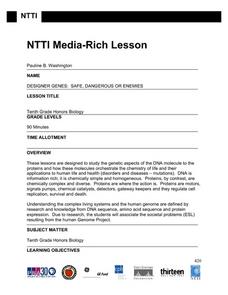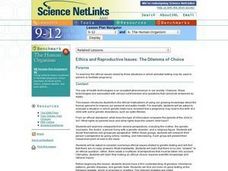Curated OER
Heredity And Environment
Students complete a pre-test on the relationship between heredity and the environment. As a class, they write down descriptions of themselves and identify which traits can be changed and not changed. In groups, they determine which...
Curated OER
Human Heredity II
Using deductive skills and reasoning based on the data provided about a family's blood genotype, blood phenotype, chromosomes, and genetic conditions, 9th graders answer the questions below. The conditions discussed are Down Syndrome and...
Curated OER
Chromosome Karyotyping
High schoolers explore chromosome karyotyping. In this chromosome karyotyping lesson plan, students use a chromosome kit to explore chromosome syndromes and disorders. They also produce a large model of a cell with chromosome to simulate...
Curated OER
Marked For Life
Students study certain genetic disorders and their effects on the lives of victims and their families. They investigate new methods of genetic screening and the social and personal ramifications of the technology.
Curated OER
Identifying Disease Genes using BLAST
Students navigate the National Center for Biological Information (NCBI) website and BLAST program to conduct a variety of biological assignments.
National Center for Case Study Teaching in Science
In Sickness and in Health
Based on family history, how likely is it that a couple's children will have a recessive disease? In an in-depth, but easy-to-follow case study, future geneticists learn the story of Greg and Olga, who are hoping to have children, but...
Howard Hughes Medical Institute
A Lesson on the Nature of Science
If you are looking for a great way to present natural selection in humans, look no further. This handout is intended to accompany the 14-minute video The Making of the Fittest: Natural Selection in Humans, which can be found on the...
Curated OER
Gene Action/Mutation Worksheet
High schoolers define the following terms: mutation, mutagen and give examples of how they work. They also define and illustrate a point mutation. Students define and illustrate a frame shift mutation and name two types of frame shift...
Curated OER
DNA AND PROTEIN SYNTHESIS IN THE CELL
Students explore the structure of DNA and the process of DNA replication, describe the process of protein synthesis, recognize the importance of proteins in the human body, and look at how mutations affect protein synthesis.
Curated OER
STS Biology - Teaching Controversial Topics
Each of the three activities submitted presents difficult science topics in the context of the human experience. The activities focus on real-world problems, which have science components, from the learners' perspectives.
Curated OER
The Genetic Basis of Neurological Disorders
Students describe some aspects of known genetic defects on the human neurological condition. They participate in a variety of exercises including drawings, games, and analogies.
Curated OER
DNA Technology
In this DNA technology learning exercise, students will review 12 vocabulary words relating to the uses and results of DNA technology in this crossword puzzle.
Curated OER
Temperature and the Tomato
You will need a photovoltaic system and monitor at your school in order to obtain all of the data required to thoroughly implement this lesson. Your class monitors daily temperature and insolation amounts over a two week span of time....
Curated OER
Recovering the Romanovs
Learners use DNA to solve an identity mystery. For this biology lesson, students use the Internet to gather information about sex-linked disorders and complete a Punnett square for hemophilia, then examine a handwriting analysis, ear...
Curated OER
Heredity Mix 'n Match
Students randomly select jelly beans that represent genes for several human traits such as tongue-rolling ability and eye color. Then, working in pairs (preferably of mixed gender), students randomly choose new pairs of jelly beans from...
Curated OER
Sleep Disorders
Students reach sleep, dreaming and sleep walking. They research these topics at the provide web links as they read through the narrative and questions.
Curated OER
Reaching New Heights
Students consider the impact of genetics on a person's intelligence and appearance. After reading an article, they examine the controversy over using human growth hormones. They debate the approval of using the hormone to increase the...
Curated OER
Risk Factor Roulette
Students examine "multiple chemical sensitivity" and how it relates to genetic variation and environmental factors. They read an article, conduct research, and identify risk factors related to chemical sensitivity, asthma, breast cancer,...
Curated OER
The Effects of Alcohol and other Teratogens: A model using Zebrafish
Students investigate the interference of various drugs on an embryo through experimentation. This is an open-ended lab to allow students to see effects of various chemicals humans choose to put in their bodies and create questions they...
Curated OER
Ethics and Reproductive Issues: The Dilemma of Choice
Students research various websites to answer questions and take part in class discussion regarding Prenatal testing. Students listen to an audio file and complete student worksheet. Students discuss different roles of people and...
Curated OER
DNA and Protein Synthesis in the Cell
Students explore how DNA fits into chromosomes and how chromosomes relate to the human body. Students learn about DNA replication and protein synthesis and model these two processes.
Curated OER
DNA and Protein Synthesis in the Cell
Students explore how DNA fits into chromosomes and how chromosomes relate to the human body. They learn about DNA replication and protein synthesis and model these two processes in Web activities.
Curated OER
How Does a Pedigree Help Us to Trace a Trait That is Inherited?
Learners analyze genetic patterns. In this pedigree lesson, students determine dominant or recessive inheritance. They construct a human pedigree from genetic information.
Curated OER
Genome: The Secret of How Life Works
What do you have in common with a fruit fly? About 60 percent of your DNA. The resource, divided into two units, is intended for grades four to eight and another for high schoolers. Both units include eight lessons covering the...


